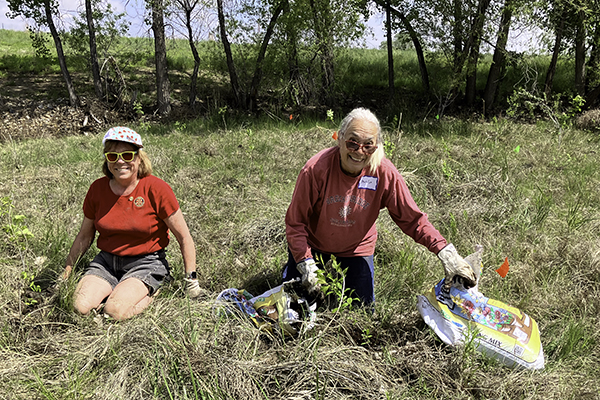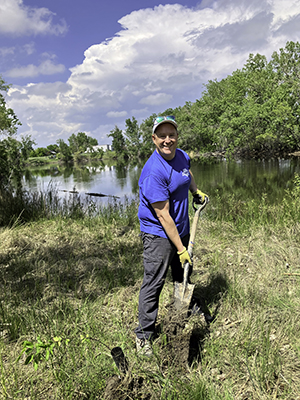
By Ashley Kasprzak, past president (2022-23) of the Rotary Club of Longmont Twin Peaks, Colorado, USA
I may have “cause-related” Attention Deficit Disorder. Yes, I made up that phrase, and I am smiling. I would bet there are some others reading this who have a similar disposition. I believe that there are so many ways to improve the world, and I want to do them all. I want to engage with nonprofits that feed the hungry, provide housing for the homeless, educate children from preschool through graduation, bring the arts to more people, and much more.
I fell in love with Rotary because it addresses diverse issues. I currently serve on the Board of Directors for Twin Peaks Rotary Club Longmont. As an organization, Rotary members believe we have a shared responsibility to take action on our world’s most persistent issues. In 2020, Rotary added protecting the environment as one of its areas of focus.
While president of my club, I selected a service project. I veered away from supporting youth (as our club typically does) because I feel like it’s time to show more gratitude to the Earth. The project I chose enlisted our members in helping pollinators like bees, butterflies, moths, and other flying creatures who do the important work of pollinating plants we use as food.
I envisioned this project in June 2022. I called the city of Longmont in September to ensure that we could schedule the group project before my term ended. I’m glad I called when I did, because it took several months to reach the right people and finalize the arrangements. Representatives of the city of Longmont were more than happy to work with us when they learned:
- We would pay for the plants and shrubs up to $500.
- We were amenable to their guidance on native plantings.
- We let them choose the location.
Our club had resources and their team had the expertise. I let them choose a grower that offered native plants. The city chose Dicken’s Nature Farm as the location. That was perfect because members of our club have collected trash there for a decade. While I was slightly disappointed that the location was not on an already established walking trail, the area definitely needed rehabilitating. It had been affected by a devastating flood in September 2013, changing everything in the path of the St. Vrain River and wrecking outlying ponds and marshes.

The city staff asked us to work on a space adjacent to a pond. Twelve volunteers showed up on a warm May morning in 2023, ranging in age from 13 to 76. The city’s volunteer coordinator and lands caretaker were quite thorough in their training. We took part in a required 30-minute tutorial, so once it was time to get to action, we were very focused and everyone engaged in the project safety.
We planted 60 trees and shrubs in two hours. Our group energy was beautiful. After our efforts, I could tell the trees and shrubs were alive. They will blossom and attract buzzing insects next spring.
Lessons I learned from this project:
- If you think a service project is worthwhile, don’t give up. I made at least five phone calls and sent multiple emails to work things out with the city.
- Respect the experts and let them lead.
- Bring human and financial resources to the table.
- Expedite the training process by making clear the level of knowledge your volunteers possess upfront.
- Research how your project fits into other efforts. After our project concluded, I realized that Rotary has an Environmental Sustainability Rotary Action Group. We added to the growing movement of pollinator protection!
To participate in the international movement, our club also signed a Pollinator Pledge.
Learn more about how Rotary is protecting our environment
https://blog.rotary.org/2023/12/13/restoring-habitat-and-helping-pollinators-in-colorado/
